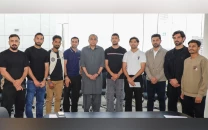10 years on: An ‘Aadat’ that changed the course of pop music in Pakistan
A decade later, the influence of the surprise hit is undeniable.

A decade later, the influence of the surprise hit is undeniable.
Has it really been 10 years since Aadat was released? This is the general reaction of the generation that was growing up during the Indus Music (IM) era of Pakistani music. It really is surprising, because apart from being a defining moment in the history of Pakistani pop music, Aadat is still relevant, which is shocking, given that a decade has passed since it first hit the airwaves.
It was December 2003 when two novice musicians named Atif Aslam and Goher Mumtaz released Aadat as the duo Jal, a track which not only became the biggest hit of the decade but also gave us the biggest controversy of modern day Pakistani music.
The Express Tribune spoke to established Pakistani musicians and Atif Aslam himself regarding why this song became such a sensation and about the impact it left on our music industry. Goher Mumtaz, who is now the font man of Jal, refused to give a comment, despite repeated attempts to contact him.
Asad Ahmed, one of the leading guitar players in Pakistan, was perhaps one of the very few people who listened to Aadat before its official release. “I remember Atif and Goher had come to get my feedback on the song through a common acquaintance and they were clueless about music in general and what they had created,” recalls Ahmed.
“We still make fun of our first meeting whenever we interact,” he chuckles, “To be frank, I thought Atif’s voice was great and the song was simple yet catchy, but never knew that it would become such a huge hit. But then, all the game changers of Pakistani pop music have been very simple [compositions] — be it Dil Dil Pakistan, Dekha Na tha by Alamgir or Aadat for that matter”
The sheer scale of Aadat’s success was unfathomable, even for Atif Aslam. He had realized that the song was gaining popularity after it first aired, but it did not sink in fully until a friend called him from Karachi to tell an interesting story.

“I was still aloof about what had just started” recalls Atif. “ Then, one evening , a few months after the release, I got a call from a friend in Karachi who excitedly told me that he’d gone shopping at a mall where he saw some college kids sitting outside playing a guitar and singing. When he got closer, he realized they were singing Aadat. That was the first time I realized that this song was going to be something very special for the Pakistani youth.”
Faisal Rafi, a music producer who has worked with acts such as Strings, Karavan and Kaavish to name a few, believes that while Aadat didn’t necessarily offer something new, it did open many other doors for Pakistani musicians.
“I think the most important contribution of Aadat to the local music scene was the fact that it was the first Pop/Rock song to go to go to Bollywood, and opened avenues for every other band/artist [across the border]. We already had the likes of Nusrat Fateh Ali Khan going there, but not a young Pop act per say,” says Rafi.
Aslam thoroughly agrees with Rafi’s point regarding Aadat and states that it was a song from where it all began, for him.
“Aadat was where it began for me. It changed my life, its success strengthened my faith and lead me to record my first album, which in turn resulted in my going to India to pursue a career in playback; none of which would have been possible without Aadat,” says Aslam.
For guitar virtuoso Faraz Anwar, it was the very simple chord progression, one minor chord and two major chords, that he feels not only made people listen to the song but also pick up a guitar to play it, which he believes was the real reason for its popularity.
“It certainly didn’t offer anything new. The chord progression was generic, and Atif’s style of singing was very much inspired by Ali Azmat. It was this combination that really worked for the audience,” says Anwar.
However, what irks Anwar about the Aadat phenomenon is the fact that the song gave the music industry a formula to follow, and musically Jal wasn’t necessarily a very great example.
“Bands like Jal, who come into the mainstream after a few months of jamming, have always existed. It’s their short-cut to success that gives them so many followers. But at the end of the day there is a fine line between artists and entertainers, and it’s not one that everyone can tread.”
Faizan-ul-haque, former VJ on Indus Music [IM] has an interesting take on Aadat.
“Critically speaking, Aadat was not the best song of its time, but it is one that the young public connected with the most,” says Haque.
“It turned Atif, who was hardly a Shafqat on melodies or an Ali Noor or Ali Azmat in terms of image, into an icon. Today, he is the most hardworking of all Pakistani pop singers and looking back now, Aadat seems to be nothing short of genesis.”
Aslam, on the other hand, realizes his naivety during his Aadat days and considers the experience one that made him more humble about his music.
“We thought we knew everything, but we were wrong. Such is the joy of teenage hubris. I’ve grown up since then, Aadat and Jal were over a decade ago,” Aslam concludes.
While Aslam may have moved on, it is undeniable that Aadat had a long reaching effect, one that is still making waves in the industry today.
Published in The Express Tribune, December 4th, 2013.
Like Life & Style on Facebook, follow @ETLifeandStyle on Twitter for the latest in fashion, gossip and entertainment.


1733130350-0/Untitled-design-(76)1733130350-0-208x130.webp)
















COMMENTS
Comments are moderated and generally will be posted if they are on-topic and not abusive.
For more information, please see our Comments FAQ